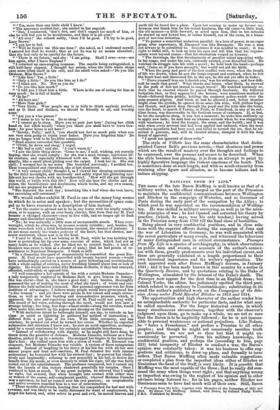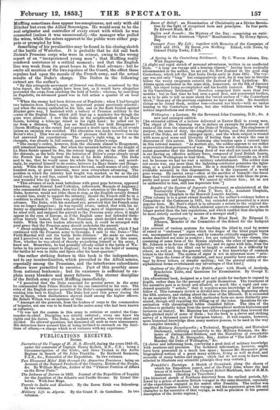PASSAGES FROM MY LIFE."
THE name of the late Baron Muffling is well known as that of a military writer, as the officer charged on the part of the Prussians to maintain the confidential communications between Wellington and Blucher in the campaign of Waterloo, and as Governor of Paris during the early part of the occupation by the Allies ; to which post he was appointed on the recommendation of Welling- ton. lie was skilled in military surveying, as well as in the scien- tific principles of war; he had ripened and corrected his theory by practice, (which, he says, was his only teacher,) having served in the Prussian army from 1792 till the final close of hostilities. Being placed in very confidential positions, and in close rela- tions with the superior officers during the campaign of Jena and the war of Liberation in Germany, he was well acquainted with the secret particulars of many events, and witnessed the behaviour of many distinguished men in critical circumstances. Passages from My Life is a species of autobiography, in which observations on public men and events, or accounts of the author's connex- ion with them, greatly predominate over his individual career, and these are generally exhibited at a length proportioned to their own historical importance and the writer's opportunities. The book appeared soon after Baron Miiffling's decease, in January 1851 ; and it has been made known in this country by a notice in the Quarterly Review, and by quotations relating to the Duke of Wellington, stimulated by the interest of the Duke's death. The Passages now appear for the first time in an English dress ; but Colonel Yorke, the editor, has judiciously omitted the third .part, which related to an embassy to Constantinople ; substituting in its stead the author's published work on the Campaigns of the Sile- sian Army under Field-Marshal Blikher in 1813 and 1814.
The opportunities and high character of the author render him an unimpeachable authority for particular facts, and for what may be called anecdotes. For the larger historical events, in which many simultaneous circumstances, together with the observer's judgment upon them, go to make up a whole, we are not so sure that the Baron is to be implicitly followed ; for he is not inacces- sible to personal weaknesses or national prejudices. Like Nelson, he " hates a Frenchman," and prefers a Prussian to all other peoples ; and though he might not consciously sacrifice truth to patriotism, we are not so clear but that it might un- consciously be perverted. From his military knowledge, his confidential position, and perhaps the (according to him, page 225) total incapacity of Blucher to conduct a war, the Baron's opinion was constantly taken : it was his business to offer sug- gestions and criticisms, to draw up plans, and formally to issue orders. That Baron Miffing. often made valuable suggestions, or completed a plan from the imperfect ideas either of Blucher or Gneisenau the head of the Staff, is very likely. It is possible that Muffling was the most capable of the three ; that he really did com- mand the army when things went right; and that anything wrong or imperfect was owing to the neglect of his opinion and to other advisers being listened to ; for in his pages, neither Blucher nor Gneisenau seem to have had much will of their own. Still, Baron • Passages from My Life; together with Memoirs of the Campaign of 1813 and 1814. By Baron von Muffling. Edited, with Notes, by Colonel Philip Yorke, F.R.S. Published by Bentley.
Miffing sometimes does appear too conspicuous, not only with old Blucher but even the Allied Sovereigns. He would seem to be the real originator and controller of every event with which he was connected (unless it was unsuccessful)—the manager who pulled the wires, while the actors apparent to the public were either pup- pets or prompted by him. Something of his peculiarities may be found in his closing sketch of the battle of Waterloo. It is probable that he did call bank Zieten's Prussian corps who were in retreat, owing to the wrong report of an "inexperienced young man " ; that Muffling really rendered assistance at a critical moment ; and that the English line was weak from its great losses in the final advance : but he omits all mention of the two repulses of the Guard, the effect those repulses had upon the morale of the French army, and the actual results of the Duke's charge. The Italics in the following extract are the author's.
"By this retrograde movement of General von Zieten, occasioned by this false report, the battle might have been lost, as it would have altogether prevented the corps from reaching the field of battle ; whereas, by marching on Papelotte, its advanced guard was in full action a quarter of an hour later.
"When the enemy had been driven out of Papelotte ; when I had brought two batteries from Zieten's corps, to important points previously selected ; and when the enemy enfiladed on his line, and on the flank formed against Blather gave way, I hastened with a battery of Prussian artillery to the centre of the English line, which still kept up a musketry fire though the guns were silenced. I met the Duke in the neighbourhood of La Haye Sainte, holding a telescope raised in his right hand : he called out to me from a distance, ' Well, you see Macdonell has held Hougomont !' [Baron Muffling at the outset had expressed a doubt upon this, at all events unless an omission was rectified. The alteration was made according to the Baron's idea.] This was an expression of pleasure that his brave comrade had answered his expectations. The enemy's right wing, as far as the chaussie, was already in full retreat, pursued by Zieten's corps. "The enemy's centre, however, from the chausede almost to Hougomont, still remained immoveable. But when the mounted battery on the height of La Kaye Sainte opened its lire, the retreat began also on the other side of the chaussee, as the balls from the batteries of Biilow'e corps already swept the French line far beyond the farm of La Belle Alliance. The Duke said to me, that he would cause his whole line to advance • and accord- ingly, he repaired himself to its centre, between La Haye Sainte and Hougo- mont. When the line of infantry moved forward, small masses of only some hundred men, at great intervals, were seen everywhere advancing. The position in which the infantry had fought was marked, as far as the eye could reach, by a red line, caused by the red uniform of the numerous killed and wounded who lay there. "This advance of such weak battalions with great gaps between, appeared hazardous, and General Lord Uxbridge, (afterwards Marquis of Anglesey,) who commanded the cavalry, drew the Duke's attention to the danger. The Duke, however, would not order them to stop, as the English cavalry formed a second line, ready to support the infantry, should the French still be in a condition to attack it. There was, probably, also a political motive for this advance. The Duke, with his practised eye, perceived that the French army was no longer dangerous ; he was equally aware, indeed, that with his in- fantry so diminished he could achieve nothing more of importance :), but if
he stood still, and resigned the pursuit to the Prussian army alone, it might appear in the eyes of Europe, as if the English army had defended them- selves bravely indeed, but that the Prussians alone decided and won the battle. When the two leaders afterwards met, it could be arranged with good grace that the Prussian army should undertake the pursuit. " About midnight, at Waterloo, returning from the pursuit, which I had continued with the Prussian army to Genappe, I said to the Duke—' The Field-Marshal will call the battle Belle-Alliance.' He made no answer, and I perceived at once that he had no intention of giving it this name. Now, whether he was afraid of thereby prejudicing himself or his army, I know not. Meanwhile, he had probably already called it the battle of Wa- terloo in his previous report to England ; for he was in the habit of naming the battles he won in India and Spain after his head-quarters."
One rather striking feature in this book is the independence, not to say insubordination, which prevailed in the Allied armies, especially among the Prussians, and the interference subordinate officers were permitted to exercise. Part of this possibly arose from national bonhomie ; but its existence is sufficient to ex- plain many blunders and many failures. The sterner discipline of the British army struck Muffling immediately.
"I perceived that the Duke exercised far greater power in the army he commanded than Prince Bliicher in the one committed to his care. The
rules of the English service permitted the Duke's suspending any officer and sending him back to England. The Duke had used this power during the war in Spain, when disobedience showed itself among the higher officers. Sir Robert Wilson was an instance of this.
"Amongst all the generals, from the leaders of corps to the commanders of brigades, not one was to be found in the active army who had been known as refractory. "It was not the custom in this army to criticize or control the Com- mander-in-chief. Discipline was strictly enforced ; every one knew his rights and his duties. The Duke, in matters of service, was very short and decided. He allowed question; but dismissed all such as were unnecessary. His detractors have accused him of being inclined to encroach on the func- tions of others,—a charge which is at variance with my experience."



























 Previous page
Previous page